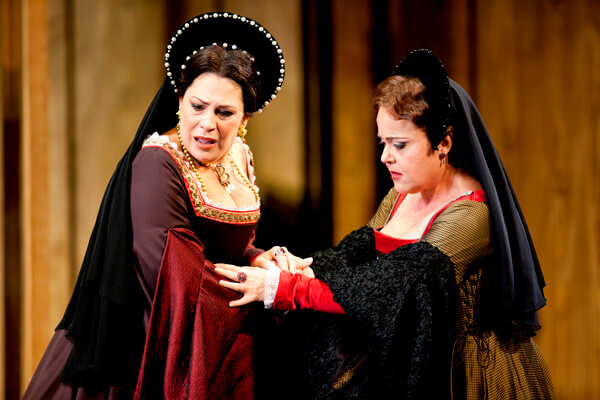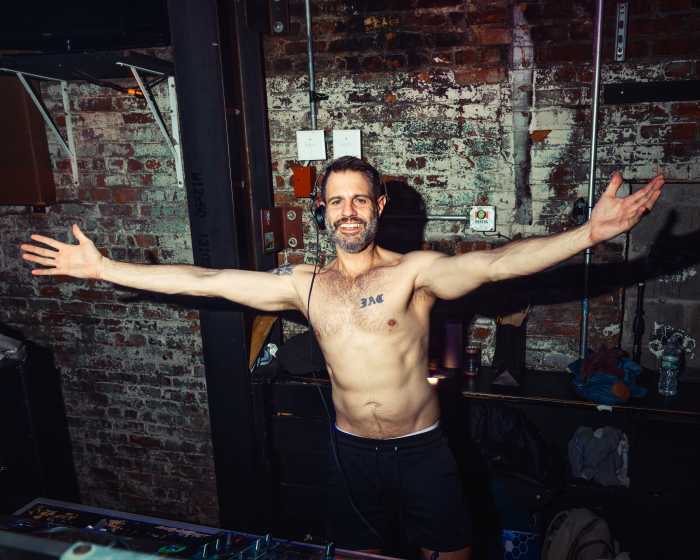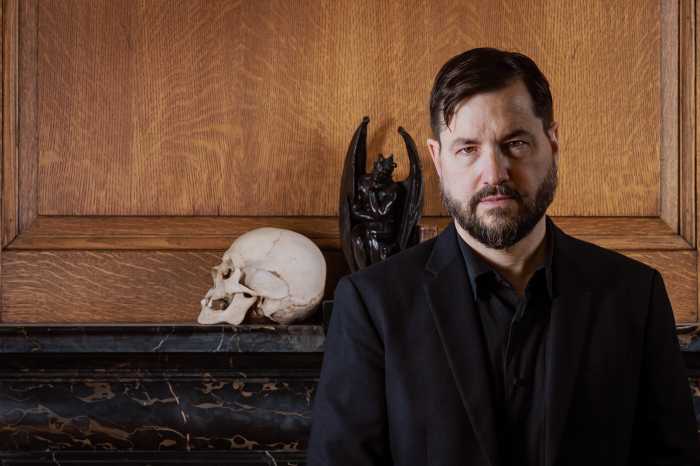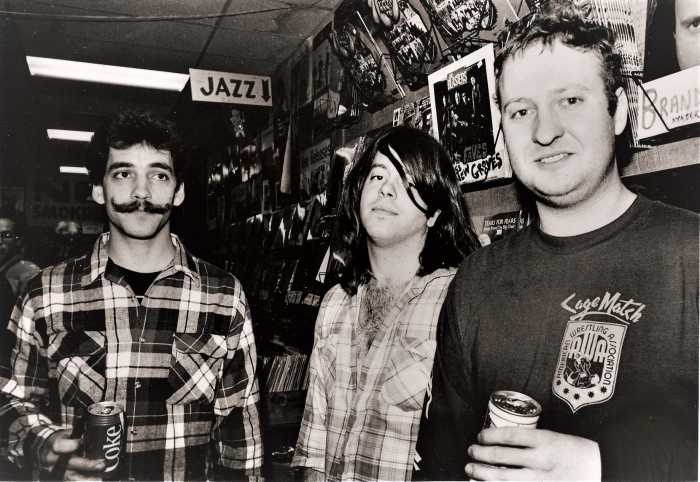Sondra Radvanovsky and Sonia Ganassi in the Washington National Opera’s production of “Anna Bolena.” | SCOTT SUCHMAN
Like the Metropolitan Opera, both of Washington’s principal opera companies began their seasons with works from the bel canto repertory. The results were pleasing, though uneven.
Washington Concert Opera, founded by Stephen Crout in 1986, plays a role in the capital’s operatic life similar to Opera Orchestra of New York hereabouts. It has presented dozens of less familiar works with a wide range of rising and current stars. WCO tends these days to perform two works per year, almost always in George Washington University’s Lisner Auditorium (easy to reach by the Metro from Union Station — I saw more than one day-tripping New Yorker in the matinee audience for “La sonnambula” on September 16).
The performance of Bellini’s splendid opera semiseria was dedicated to the memory of the late Evelyn Lear, one of the company’s “godmothers.” What struck one above all was the high quality and stylistic understanding of Antony Walker’s conducting, a tonic after hearing so many indifferently led bel canto traversals in New York, Munich, and Houston in the past year.
Eglise Gutiérrez is already a practiced, highly effective Amina; her performance was the more communicative and impressive for being virtually “off-book” when most of her colleagues stood riveted to their music stands. Gutiérrez commands a spectacular, individual. and ravishingly deployed voice, and is streets ahead of the women the ever-mystifying Met casts in her repertory.
Amidst all the glorious sounds she made were a scattered few less-than-comfortable attacks on forte high notes. As her voice seems to be expanding, this might suggest an eventual move away from high coloratura parts to such roles as Luisa Miller and Giovanna d’Arco.
My other complaint about Gutiérrez’s work here was that she ornamented first verses of things — including the sublime “Ah non credea mirarti” — so that one didn’t get to hear Bellini’s original melodies in their pristine state, which seems a mistake. Most of her ornamentation was highly impressive, with just few moments of misfire, like a crop of stunning staccati in “Ah, non giunge” followed by some that just refused to emerge cleanly. Still, hers was a memorable performance.
So was that of Tejano tenor René Barbera as Elvino — a treacherously high-lying part, for once approached from a position of security and strength. Barbera dispatched the music with fine musicianship, a consistently pleasant sound even up to high D, and a command of dramatic nuance; all that was lacking was a sense of dramatic urgency staged performances of “Sonnambula” should supply. This tenor has a great deal to offer the opera world.
Ben Wager, like Guttierez a graduate of Philadelphia’s Academy of Vocal Arts, showed improvement over his conservatory Rodolfo, with his solid if sometimes too highly placed bass-baritone affording more agility and smoother legato line. He made a handsome and expressive figure onstage.
Maureen McKay gave a more-substantial-sounding-than-usual Lisa, acting Amina’s minx-like rival in admirable detail. Like Wager, she has grown as an artist from her overseas experiences. Madeleine Gray made a conventional, somewhat melodramatic Teresa. Someone should have let the tall mezzo know that leaving her music stand fully up even when she wasn’t singing would block many spectators’ view of the principals.
WCO’s season continues with Donizetti. On Sunday, April 7, at 6 p.m., Walker leads Georgia Jarman and Brenda Harris — two well-contrasted, persuasive, style-informed divas too little seen in New York — in “Maria Stuarda.”
The Washington National Opera’s “Anna Bolena,” though a serious effort by Stephen Lawless to bring out the work’s dramatic stakes and confrontations, had a more muted success. Conductor Antonello Allemandi was competent but brought no special insight to his task, not obtaining optimal instrumental clarity and often letting what should be propulsive rhythms flag.
The company’s previous “Bolena,” in 1993, offered superb characterizations by Nelly Miricioiu, Judith Forst, Jeffrey Wells, and Jorge Lopez-Yanez. With the underappreciated Eduardo Mueller in the pit, it remains the strongest account of this masterpiece I’ve encountered.
In Benoit Dugardyn’s Tudor theater-like galleried space, Lawless staged a vivid, often surprisingly witty show, with a few stumbles — far too much visual and emotional focus-stealing by an improbably tall Elizabeth (less than three when her mother was executed), plus a baffling if ostensibly homoerotic dance/ fight by antlered shirtless hunks which obscured the drama of “Ah, segnata e la mia sorte.”
Sondra Radvanovsky’s first Anna Bolena was a well-studied, powerfully sung and generally effective effort. She enjoys an unmistakable personal sound — a rarity these days — and, though she tackled some faster numbers with insufficient rhythmic dispatch, Radvanovsky remains capable of coloratura and dynamic shading. Certainly she dominated the ensembles.
As with Anna Netrebko at the Met, one wanted Radvanovsky to sing more “off the words,” but when she did connect with the text — as in the great duet with Sonia Ganassi’s efficient and idiomatic, if hardly warm-voiced, Giovanna Seymour — the results were impressive. She threw in so many scorching high Cs and Ds that they lost their point; certainly her otherwise haunting “Al dolce guidami” needed no such distracting blast. Radvanovsky worked hard, but well. She moves on to the Met’s “Ballo” in November.
Shalva Mukeria proved himself a good musician unfazed by Percy’s high tessitura, and finally pulled out some volume for his overdecorated last aria. For much of the evening, he made a dry, insignificant impact visually, dramatically, and vocally, showing even less stage presence than the Met’s handsome but clueless Percy, Stephen Costello. Oren Gradus doesn’t exactly command star timbre or presence either, but gave a committed, energetic performance as Lawless’ sensuous, constantly feasting Henry VIII.
In making Henry’s henchman Hervey (tenor Aaron Blake, singing well) the serpentine major schemer in the court and seemingly the king’s petted boytoy as well, Lawless took a leaf from the libretto, which — not that the surtitles mentioned it — has Anne Boleyn accusing Henry of having himself “corrupted” her adoring lutenist/ page, Smeaton, who has rashly confessed to sinning with her, his queen. This “pants part” was admirably handled by Claudia Huckle.
Other WNO highlights this season include Patricia Racette’s first-ever Manon Lescaut opposite Fabio Armiliato, and Angela Meade’s first fully staged Norma, alongside Dolora Zajick’s Adalgisa, both in March.
David Shengold (shengold@yahoo.com) writes about opera for many venues.






































